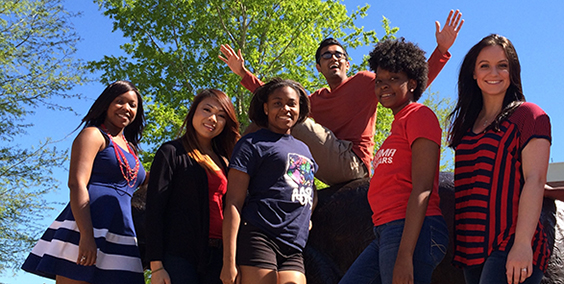First Year Experience

What is First Year Experience?
The First Year Experience (FYE) program was designed and first offered as a living learning community in 1998 to help first-time freshmen build a solid foundation for success by assisting students with their transition from high school to the University. It was revised as a first year course in 2006 and then again in 2008. In 2011/12, USA offered Freshmen Experience Courses in the College of Arts and Sciences, the College of Engineering, the Mitchell College of Business, the School of Computer and Information Sciences, and the College of Nursing. Course enrollment is typically restricted to 25 students.
Roughly 50% of class time for the FYE will include meeting general learning objectives. These learning objectives were developed by faculty to address skills needed by all new students. Faculty are also responsible for educating FYE course students in the advising process at USA and advising for general academic success.
FYE students are strongly encouraged to meet with their academic advisor and their FYE instructor prior to withdrawing from the FYE.
First Year Experience Learning Objectives (Required for All FYE Courses)
Learning objectives are guided by elements of college readiness (1) including:
Contextual skills and awareness (CS)
Academic behaviors (AB)
Academic knowledge (AK), these are most likely tied to discipline or theme
Key cognitive strategies (KCS)
At the end of the FYE, students should be able to:
- Demonstrate information literacy (AB,KCS)
- Practice written and verbal communication so students can convey their ideas to others (AB)
- Demonstrate skills and habits necessary for academic success, including submitting work on time, study skills, note-taking, test-taking, written and oral communication (AB)
- Demonstrate the ability to utilize technology (including PAWs and our LMS) in support of learning (AB)
- Identify and practice appropriate academic behavior (AB, CS)
- Practice critical thinking OR apply critical thinking strategies to a seminar project or activity (KCS)
- Explain the importance of peer review and group work (AB) and apply both practices
- Distinguish and apply various paradigms for generating knowledge (KCS)
- Develop effective time management skills (AB)
- Explain and be able to access appropriate campus resources (AB, CS)
The FYE website includes assignments designed by current FYE faculty which address the learning objectives listed above. We encourage FYE faculty to use the website and the assignments available there and to modify those so they are appropriate for their specific course.


